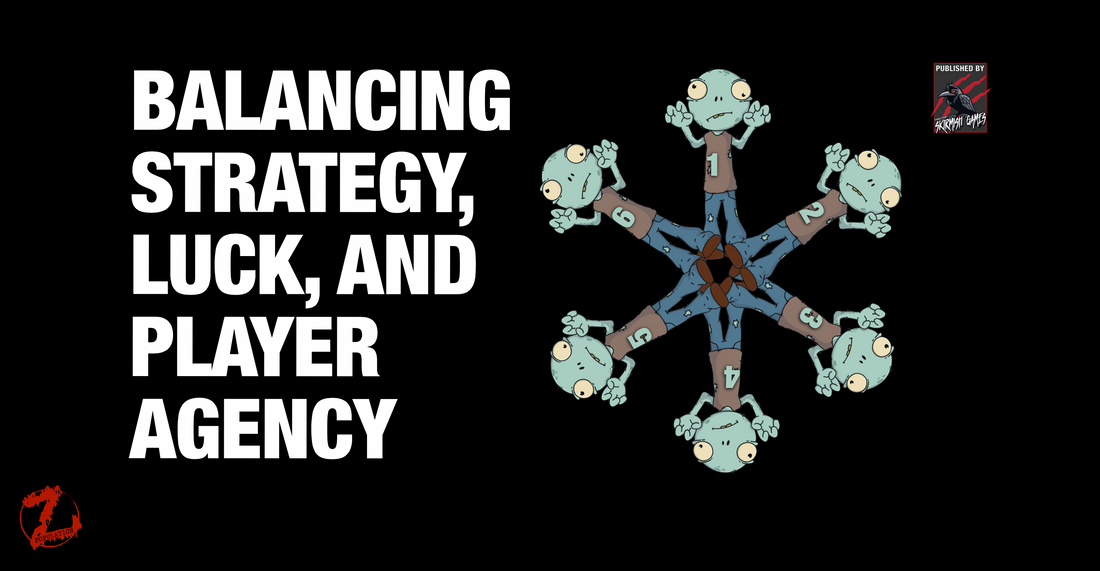Balancing Strategy, Luck, and Player Agency In Tabletop Skirmish Games
Tabletop skirmish games are a unique blend of strategy, luck, and player agency. As game designers, it’s our job to balance these three elements as we craft our core mechanics and gameplay loop. In this blog post, we’ll discuss seven critical aspects of finding equilibrium between strategic decision-making, randomness, and player empowerment.
In previous blog posts we’ve talked quite a bit about decision-making and player agency and how important they are for the gameplay loop, so in this post we’ll focus more on luck and randomness. You can make all the right decisions and all your pieces can be lined up ready to execute, but if the dice are against you, those well formed plans can quickly go south!
I Feel Lucky
Luck introduces an element of unpredictability and chance to a tabletop skirmish game, enriching the overall gaming experience in several ways. Let’s look at those now.
Suspense and Excitement
The uncertainty brought by luck, whether through dice rolls, card draws, or random events, creates suspense, anticipation and excitement during gameplay. Waiting for the dice to settle to see if a tactic will pay off is so fun. The result presents the players with more decisions to make as they continue pushing forward on a favourable roll or are forced to change course when the dreaded snake eyes reveal themselves.
Variability
Luck introduces variability to each game session, ensuring that no two matches are exactly the same. This adds replay-ability to the game, keeping it fresh and interesting even after multiple plays.
I remember playing a game of Necromunda against a friend. We played a scenario and I wiped out his gang in a handful of rounds. The game was over quickly so we decided to play the exact same scenario with the same gangs on each side. We even played using the same tactics to see what would happen. In the second game, the result was reversed and my gang took an absolute beating!
Surprises and Dynamic Moments
Randomness can lead to unexpected twists and turns in the game, creating dynamic and cinematic moments. Whether it's a critical hit from an unlikely source or a surprise event that changes the landscape of the battlefield, luck contributes to the narrative richness of the game.
Let’s stick with Necromunda as a good example of this. The game is a little more chaotic than some others, and there seems to be a bit more randomness built into the mechanics. I like those kind of games the most as they help to create more narrative and memorable experiences.
Strategic Adaptation
The presence of luck encourages players to adapt their strategies on the fly. Unforeseen outcomes may force players to reevaluate their plans and make strategic adjustments, adding depth to the decision-making process.
In Population Z, searching plays a huge role in the game and players must roll to beat their Luck characteristic to decide if they find anything. With limited actions and the ever present threat of zombies closing in, players have to decide how many searches to carry out while keeping their distance, maintaining effective weapon range, and working towards the objectives.
Equalising Factor
Luck can serve as an equalising factor in games where there is a skill disparity between players. A less experienced player may have a chance to turn the tables through a fortunate roll of the dice, keeping the game accessible and enjoyable for players of varying skill levels.
We do see this exploited somewhat in bigger games like Warhammer 40,000, with hyper competitive players choosing to memorise the probability of dice rolls, and building armies that tip the probability in their favour. But for me, that goes against the spirit of ‘play’ and is something best kept for competitive games against other players who want to compete in that way.
As I’ve said many times before, there are lots of ways to approach tabletop skirmish games and no one should tell anyone how to play their games with their models. We each find enjoyment and entertainment in different ways. I’ve found that after a few years, you settle on a style of gaming that suits you and are then drawn to other people who want to play the same way.
Thematic Immersion
In many cases, luck aligns with the thematic elements of the game. For example, a skirmish set in a chaotic and unpredictable world like Necromunda might incorporate randomness to mirror the uncertainties of battle in an environment fraught with backstabbing characters and dodgy dealings. A grenade exploding in the hands of the character or a missed shot hitting a friendly fighter instead of the enemy. You never know what will happen!
Other themes might require a bit less chaos. Bolt Action is a good example of this. The army rules provide some unique qualities to the chosen forces (factions) but overall the sides are usually quite similar. Luck then plays a big part in the outcome of battle, driving narrative and immersing players in the theme as the advantage moves back and for as the game progresses.
Risk and Reward
Luck introduces an element of risk and reward. Players may choose to take chances for potentially high rewards, adding a strategic layer to decision-making. Balancing risk and reward becomes a crucial aspect of gameplay.
While luck brings these positive aspects to tabletop skirmish games, it's important to balance it with strategic elements to avoid excessive reliance on chance. Striking the right equilibrium ensures that luck enhances the gaming experience without overshadowing the importance of player skill and decision-making. That’s the challenge of game design!
3 Ways To Balance Luck And Strategy
Now we’ve talked about luck in tabletop skirmish games, how do we balance it with strategy? Methods for mitigating the impact of luck, such as introducing strategic options, meaningful choices, or abilities that allow players to manipulate probabilities, play a crucial role in this balancing act. When we get it right, players can excel while still allowing luck to provide excitement and unpredictability, creating a game that appeals to a broad audience of different skill levels.
There are three areas we can work on to balance luck with strategy. Let’s explore those now.
1. Skill-Based Mechanics
Incorporating skill-based mechanics rewards player proficiency and strategic thinking. Mechanics like line-of-sight calculations, terrain manipulation, or timing-based actions require precision and critical thinking, enhancing player agency. These mechanics give players opportunities for competitive advantages and add yet another layer of depth to the overall gameplay experience.
A great way to introduce skill-based mechanics that give players control is to provide characters with different abilities that complement (or oppose) each other. When players can choose which characters they take into battle, they can formulate tactics with the abilities in mind.
In Population Z, player agency was something I wanted to introduce immediately. One of the first things you’ll do in the game is create your group of survivors. You choose their jobs, hobbies, and skills, and these all come with unique abilities. It’s a simple process but the combinations are immense. With 10 jobs, 10 hobbies, and 10 skills, there are many possible combinations! The outcomes are rich and varied, and during gameplay players find interesting relationships between the survivors that make for excellent manoeuvres and tactics.
2. Adjusting the Degree of Randomness
We’ve seen that there is a fine line between high randomness for casual play and lower randomness for competitive or strategic play and how important it is for us to find the right balance for out games. It’s vital in meeting the expectations of our target audience too, so we have to pay a lot of attention to it. Once we achieve that balance, we then have to think about how to provide some mechanics for player to adjust it during gameplay.
Mechanics that enable players to control or mitigate randomness provide a sense of control and strategic depth. This can be achieved by simply re-rolling a result, applying modifiers or adding an extra dice to the dice pool.
For Population Z, I created a series of probability tables for each character type (size in the game) both for melee and ranged attacks. I also made tables for each weapon. I use those tables to see what will happen when dice can be re-rolled, modifiers can be added, and extra dice are added to the pool.
These tables are invaluable in adjusting the degree of randomness, and I’ve been able to use them to make the game play out thematically. For example, I wanted melee attacks to be more deadly so there is a higher chance of causing damage in melee attacks. I also wanted terrain to be an important part of the game, so cover makes a big difference as players use it to negotiate the battlefield and close in on objectives.
Following Population Z is a sci fi solo/co-op game that uses the same core rules but altered to match the genre. I can manipulate the tables to make the randomness fit new weapons, change the effectiveness of enemies, and even flip it so ranged weapons become the ones to watch out for. I must do a blog post on these tables at some point.
3. Iterative Play-testing and Feedback
I recently wrote about the importance of play-testing and iterative refinement. I can’t go on about this enough; it’s so important. The journey to a well-balanced tabletop skirmish game involves continuous play-testing and feedback. Play-testers play a crucial role in identifying potential imbalances, frustrations, or excessive reliance on luck. The iterative process of refining mechanics, adjusting probabilities, and fine-tuning the balance between strategy, luck, and player agency is essential for creating a polished and enjoyable game.
I created a heavy machine gun weapon that I thought was designed with the correct number of shots and damage output. Play-testing revealed a flaw in that it didn’t feel like it caused enough damage for the action cost when it’s unique ability was used. I checked the tables and this proved correct. Without play-testing things like this are easily overlooked.
Since play-testing Population Z, I’ve started to introduce mini sessions where I only use one weapon or one ability, and then I play out quick scenarios repeating the use over and over again. This has worked out nicely and I recommend giving it a go in your game. My next planned session is for all the different grenade types!
Balancing Strategy, Luck, and Player Agency
By balancing luck, strategy and player agency, we can create tabletop skirmish games that offer engaging decision-making, exciting moments of chance, and a strong sense of player control. Striking the right equilibrium ensures a game that appeals to both strategic thinkers and those who relish the thrill of unpredictability, ultimately resulting in a captivating and well-rounded gaming experience.
It’s not easy to achieve balance, and the process presents many problems to solve along the way, but that’s why tabletop skirmish game design is so fun!
I hope you’ve found this blog post helpful and I’d love to hear your thoughts and opinions on the subject, so join in the conversation in the comments below.
Thanks for reading!
Lee
Look out for my new game, Population Z: Welcome to Huntsville, launching in January 2024.

